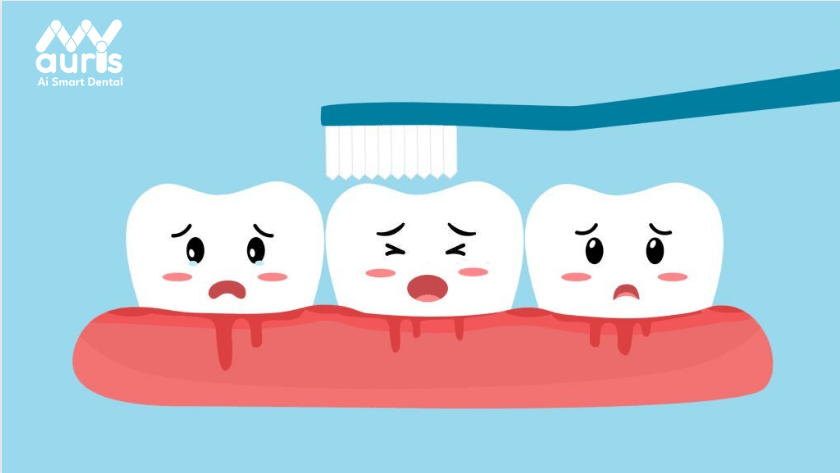Is bleeding gum inflammation in pregnant women dangerous? However, bleeding gums during pregnancy is a common problem and can cause many serious health problems. In addition, the mother needs to be careful of unusual signs to ensure the safe development of the fetus. Therefore, with My Auris dentistry, we will learn in detail about the issue below to ensure that the pregnancy is always safe. pregnant
The cause of bleeding gums in pregnant women is due to changes in the body, specifically:
- Hormonal changes: Usually starting from the 2nd month of pregnancy, the amount of hormones Estrogen and Progesterone rapidly increases, increasing blood flow to the gums, making gingivitis worse. The most recognizable signs are toothache, bleeding gums when brushing teeth, etc. However, this phenomenon can get worse in July and August and gradually decrease in the last month of pregnancy.
- Changes in Calcium: Calcium needs for the fetus are very high, this can cause pregnant women to lack calcium, causing teeth to become more porous and increasing the risk of tooth decay.
- Changes in nutrition: In the first months of pregnancy, pregnant women often have symptoms of vomiting, craving sour or sweet foods or eating more than usual, etc. Therefore, eating a lot of foods containing glucose is also the cause of tooth decay during pregnancy.

Bleeding gingivitis Are teeth in pregnant women dangerous?
Currently there is no clear evidence of the effects of gingivitis on fetal development. However, this is a warning sign that your health is not good. Besides, some dental experts say that periodontitis can be associated with dangerous complications such as:
- Premature birth
- Low birth weight fetus
- Complications of pregnancy, such as preeclampsia.
These problems can cause gingivitis and bacteria.Aggregates cause disease in the body. However, these problems are still not clearly recognized.
Some signs of gingivitis and bleeding gums in pregnant women
Gingivitis >
This is a common oral disease, accounting for about 60 – 70% of pregnant women with dental problems. Gingivitis can start from the second month of pregnancy. Easily recognizable signs are swollen, red gums that bleed easily, especially when brushing your teeth.
The cause is the increase in the Hormones Progesterone and Estrogen during pregnancy and changes in the bacterial system in the oral cavity environment. If you do not treat it, combined with poor oral hygiene, it can cause tooth decay and periodontal disease.
Periodontitis
Periodontitis is a more severe condition than gingivitis, at which point the supporting structures around the teeth lead to loose teeth and lead to to tooth loss. In addition, intermediate chemicals secreted during periodontitis affect fetal chewing by restricting blood flow to the fetus.

Gestational papillomas
Gestational papillomas will develop in the second 3 months of pregnancy. According to statistics, about 2 – 10% of pregnant women have papillomas during pregnancy. The telltale sign is the appearance of a red lump usually located in the gums, however they can be located in other locations in the mouth, and can easily bleed or ulcerate. However, this is not a cancerous tumor.
Gestational papillomas will gradually decrease and disappear completely after birth without treatment. However, this disease prevents chewing, bleeds easily, or does not disappear after giving birth, requiring a doctor’s visit to have the tumor removed.
Tooth decay
According to statistics, about 25% of women of reproductive age often have tooth decay. Tooth decay is a combination of a diet high in sugar and bacteria in the mouth that destroy tooth enamel. Tooth decay often appears as white spots, which then develop into brown cavities. If not treated completely, it can lead to tooth abscess.
How to treat gingivitis and bleeding gums in pregnant women
How to treat gingivitis in pregnant women and how to prevent it effectively.However, to reduce this condition, you can refer to some suggestions below:
Use mouthwash
In addition to brushing your teeth regularly, using mouthwash helps prevent bacteria from growing. Thereby, limiting the risk of pregnant women having bleeding gums. Be sure to choose an alcohol-free mouthwash to avoid dry mouth during pregnancy and consult your dentist to find the mouthwash that is right for you.
Scaling tartar
Daily brushing cannot remove all tartar and plaque. If there is a lot of tartar, your dentist will scrape your teeth with a specialized tool to remove the tartar deep under the gums.
Using antibiotics
Antibiotics help kill bacteria and reduce plaque, helping the gums to reduce swelling. At this time, the doctor will prescribe oral medication or apply gel or mouthwash.
However, pregnant mothers who use antibiotics must be very careful. Before using, you should consult a dentist to treat gingivitis during pregnancy.

Oral care in pregnant women
Before pregnancy
If you had dental problems before pregnancy, there is a high risk of developing dental diseases during pregnancy. Therefore, women need to take care of their teeth before trying to get pregnant by maintaining good oral hygiene:
- Brush your teeth after eating and before going to bed, especially using toothpaste containing fluoride.
- should use dental floss to clean plaque between teeth
- Regularly check your oral health and thoroughly treat dental diseases.
During pregnancy
During pregnancy, pregnant women often experience changes in the body, often with heartburn, fatigue and difficulty exercising or changes in eating habits. Therefore, pregnant mothers need to note the following below:
- Use a gauze pad with toothpaste to cleanteeth and rinse your mouth with clean water because pregnant women often experience morning sickness in the first few months.
- During pregnancy, women eat irregularly, many of them eat more sweets than usual. Therefore, tooth decay easily occurs.
- When having a dental check-up: It is necessary to inform the doctor at what stage of pregnancy you are so that the doctor can have appropriate treatment. Absolutely do not use tooth decay medication or any other medication without your doctor’s consent.
After giving birth
- Do not eat food that is too hot or too cold,
- Calcium supplementation after birth. Because calcium is the main ingredient that helps keep teeth healthy. Women who are breastfeeding need a lot of calcium, so they need to drink milk and eat lots of green vegetables and fruits to supplement calcium.
- Newborn babies do not have bacteria that cause tooth decay, so when kissing babies, they need to keep their oral hygiene clean and not give them food.
The above is all useful information about gingivitis and bleeding gums in pregnant women. From there, it helps you recognize signs of gingivitis as well as the severity or severity of the disease, helping you have a timely treatment plan. If you have any questions or concerns regarding gingivitis during pregnancy, don’t hesitate to contact us for detailed answers!
Kim Dung





